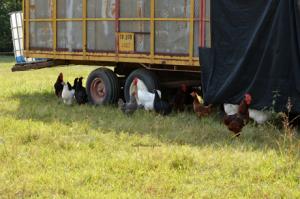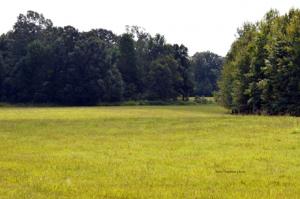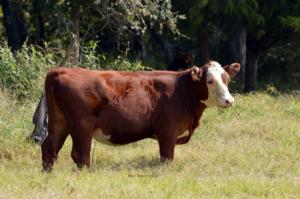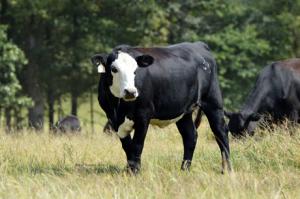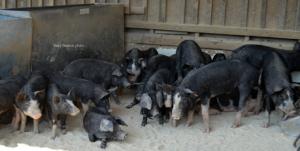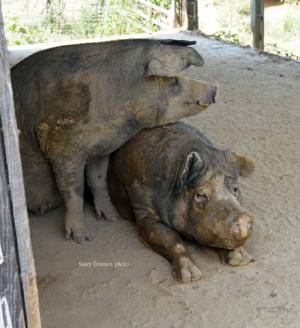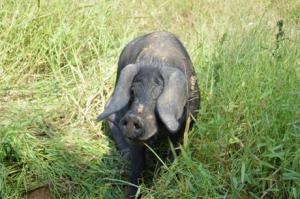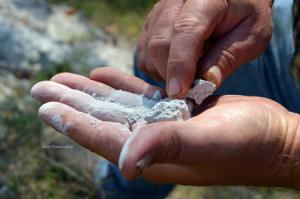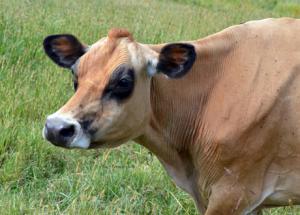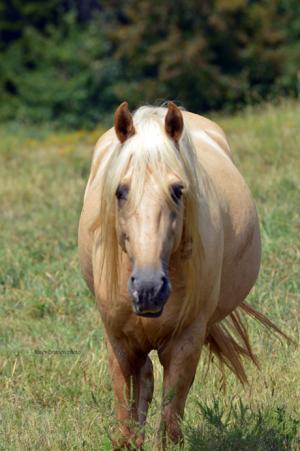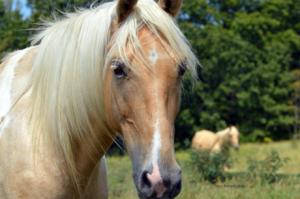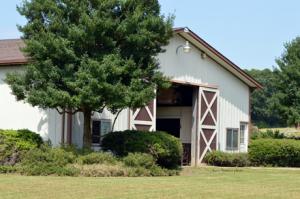Article & photos by Nancy Brannon, Ph.D.
For Winchester Farm manager Jake Waddell, improving soil health is the foundation of all his work, and he sees it as the foundation for all animal and human health. Since “we are what we eat,” eating healthier foods is important, and the source of all our food comes from the earth – soil. The healthier, more balanced the soil, the better for everyone and the planet as a whole.
“At Winchester Farm, we strive to give our horses, cattle, chickens and hogs the best life possible. We do not use pesticides, herbicides or chemicals on our farm. We raise our free-ranging animals without the use of steroids, growth hormones, or antibiotics. We have worked over the past decade to rejuvenate the soil here, and it serves as the foundation for our healthy animals and quality produce.”
Owned by Peter Schutt, who also owns The Daily News Publishing Co., Winchester Farm is 1,600 acres of rolling land near Dancyville, Tennessee. The land is a diversity of scattered woodlots that include oak, hickory, persimmon, tulip poplar, and sweet gum timber interspersed with plenty of pastures and grain fields no larger than 30 acres. Wild deer, turkey, wintering waterfowl and shorebirds, rodents and predators, bluebirds, hummingbirds, wildflowers and wild honeybees, and many others, make their home here. The flora and fauna exist alongside the farm’s herd of domestic Angus cattle, two Guernsey cows, Berkshire and Mulefoot hogs, and several varieties of laying hens.
Jake is a third generation farmer and horse trainer. His grandfather Jimmy Waddell trained Tennessee Walking Horses (TWH). Jake also trains TWHs for field trialing, trail riding, and trains Quarter Horses, too. His specialty is breaking colts. When Jake was buying and selling horses, he made sure his horses were getting the best feed he could provide. But he noticed a big difference between horses from west Tennessee and those from middle Tennessee and Kentucky. “The Kentucky horses were in ten times better condition – mainly because they grazed on soils rich in calcium. From then he began to realize the importance of mineral balance in the soil for growing healthy horses.
Jake graduated from UT Martin with a traditional agri-business education. In high school he checked cotton, and then had his own consulting business for 12 years checking cotton. “I walked about 12,000 acres a year through cotton fields,” he said. He recalled the development of chemicals to eradicate the boll weevil and the development of glyphosate, aka Roundup®: “supposedly a silver bullet” to alleviate the bug problem. “But we had no idea what it really did and what we’re doing to our soils,” he said. In his work on soil recovery at Winchester Farms, he has noticed that it takes around seven years for soils to recover from having had chemical herbicides sprayed on them.
The main part of his soil recovery program is adding lime and nutrients to the soil on a regular basis to balance it. He likes the liquid nutritional products from Growers Mineral Solutions, Milan, Ohio. [http://www.growersmineral.com] He combines their Growers Mineral Solutions, a food safe fertilizer product that provides highly soluble plant nutrients, with lime, “It’s a clean NPK product with trace minerals,” Jake explained.
He emphasizes the importance of using lime to add calcium to the soil. “You can’t put too much in; it balances everything.” He does find, however, that the limestone available to west Tennessee farmers is really not ground fine enough. He wants the lime put on his fields to be a powder, but what’s available here is more the size of sand with larger nuggets. He says it takes a long time for the nuggets to break down. He also recommends that when fields are limed, you work the lime into the soil – lightly disc or harrow it in – rather than leaving it on top of the grass. That way it doesn’t wash off when the rains come.
For fertilizer, he uses a 10-20-10 foliar fertilizer, rather than granular. “Plants utilize it better through their leaves, rather than drawing it up through their roots,” he explained. Foliar feeding is a technique of feeding plants by applying liquid fertilizer directly to their leaves. Plants take in nutrients more efficiently through stomata (plant pores) in their leaves than they do through root uptake.
He also puts down cow manure, organic fertilizer, and uses a combination of rotational grazing and intensive grazing with his cattle. “The cows only stay on one field for three days; then they are moved to another field.” His eventual goal is to graze his cattle 12 months of the year, with having to feed them hay.
Chicken manure is high in nitrogen, “but it’s not the same as fertilizer nitrogen,” he explained. “It’s not made from petroleum and its properties don’t act the same way.”
“It’s all about the soil,” Jake explained. “All animals are a product of what’s in (or not in) the soils. I try to replenish what was lost in the soils through conventional farming. The soil has a seed bank in it. When the soil chemistry gets to the right conditions, the seeds germinate. If you see a lot of weeds in a pasture, that’s an indication that something is not right with the soil.”
His biggest concern regarding soil health is the residual effects of glyphosate. Research by Don Huber, Professor of Botany and Plant Pathology at Purdue University, and Barney Gordon, Agronomist at Kansas State University, found that “using glyphosate is complicating the uptake of some minor nutrients.” The Kansas and Indiana studies found glyphosate resistant soybeans to be vulnerable to manganese deficiencies, while non resistant varieties were not. Glyphosate was originally developed as a chelating agent, meaning its molecule wraps around the molecules of other elements, making them unavailable. “Because of that, the plant cannot utilize the elements, and glyphosate compromises plants’ immune systems. Then the plant dies of a disease similar to HIV/AIDS,” Jake explained.
“Roundup® ready plants are genetically modified to grow without 12 essential metals that we and our horses actually need. If you do an Internet search with key words ‘effects of Roundup,’ you will get a lot of information about the toxicity and health problems linked to glyphosate.”
The philosophy of the farm practices are balance and sustainability. “We believe natural, chemical-free farming produces the best fare. Where so many industrialized farms are fighting against nature, we prefer to work with Nature and the elements, utilizing the Earth’s natural chemicals to achieve a natural balance of nutrients. Everything we do starts with the soil. Humus is the ultimate in fertile soil, full of organic matter, nutrients, and life. To counterbalance the damaging effects of conventional farming, we apply large quantities of ground limestone (calcium) to all of our pastures and grain fields. Calcium, which essential for soil health, is often stripped out without being properly replaced on conventional farms. After several years using this technique, we’re successfully restoring the land to its natural balance of minerals and nutrients.”
Jake says that in trying to “conquer Mother Nature, we will eventually eradicate ourselves. But Mother Nature can fix problems we create – but not in our time and not in the way we may want it fixed. When man changes his perspective of soil from a commodity that he owns to a community to which he belongs, he will hold the soil in higher regard.”
Sustainable farming is thinking about the future. Jake’s management of Winchester Farm is committed to reversing the harmful effects of chemical-based farming on the land and utilizing a responsible farming model that can provide ample produce and livestock without exhausting the natural resources. “We are growing food not just for ourselves, but for future generations,” he said.
“If you have earthworms and night crawlers the size of your pinky in the soil, then the elements of the soil are functioning properly. If you have worms only the size of pins, things are not going right. It took seven years to see an explosion of earthworms out here, some of which were the size of small snakes.”
In horse training, Ray Hunt changed his life. When Ray Hunt came to Wildwood Farm in Germantown, TN for a clinic, Jake was there. “The first thing Ray Hunt said was: ‘a horse is very sensitive; he can feel a fly land on him.’” Jake described his lesson with Hunt with a horse that could not be mounted. As he watched Hunt solve the problem, he knew he wanted to learn the Ray Hunt method. The following year he went to ride with Ray Hunt again and later went to Mountain Home, Idaho to spend two weeks learning from Hunt. “You have to develop a different way of looking at things,” Jake realized.
Developing a different way of looking at things is the way Jake has transitioned away from the traditional, chemical farming methods he learned in school, to being more closely observant of what’s growing in the fields, how the animals that graze the fields are faring, and working with Mother Nature, rather than against nature. It’s a practice meant to make one small piece of the world a better place.
Additional Resources:
http://www.winchester-farm.com/
Read Peter Schutt’s blog at: http://www.winchester-farm.com/blog/
History of Winchester Farm, by Linda Hunt: http://www.dancyville.net/history/trial/winfarm.htm
In 1986 Stephen Walker, from Novato, CA came to west TN at the invitation of Bill and Linda Hunt. Stephen’s main avocation was field trial bird dogs. He bought 855 acres near Dancyville that he called Winchestesr Farm. “What followed in succession was a barn, which housed the office facility, kennels and horse stalls as well as ample space for parties and dinners during the field trial season. A lodge was completed for the Walkers, a mobile home, and house for managers. Later a second house for additional employees was added as well as other building for shop and storage..
“The area was managed with quail habitat in mind. David Johnson, who had also relocated to Dancyville, was most capable with the [bird] dogs as well as taking care of the habitat. …The Walker-Hunt team was very successful in the field trial world. Rebel Wrangler, an orange and white pointer, broke the record for open all ages championships (that stood at 12 for many years) by amassing 14 such titles. He was named Purina Dog of the Year twice. He was elected to the Field Trial Hall of Fame in 1997.
“In 1998 Winchester Farm was sold to Peter Schutt of Memphis.”
For Winchester Farm manager Jake Waddell, improving soil health is the foundation of all his work, and he sees it as the foundation for all animal and human health. Since “we are what we eat,” eating healthier foods is important, and the source of all our food comes from the earth – soil. The healthier, more balanced the soil, the better for everyone and the planet as a whole.
“At Winchester Farm, we strive to give our horses, cattle, chickens and hogs the best life possible. We do not use pesticides, herbicides or chemicals on our farm. We raise our free-ranging animals without the use of steroids, growth hormones, or antibiotics. We have worked over the past decade to rejuvenate the soil here, and it serves as the foundation for our healthy animals and quality produce.”
Owned by Peter Schutt, who also owns The Daily News Publishing Co., Winchester Farm is 1,600 acres of rolling land near Dancyville, Tennessee. The land is a diversity of scattered woodlots that include oak, hickory, persimmon, tulip poplar, and sweet gum timber interspersed with plenty of pastures and grain fields no larger than 30 acres. Wild deer, turkey, wintering waterfowl and shorebirds, rodents and predators, bluebirds, hummingbirds, wildflowers and wild honeybees, and many others, make their home here. The flora and fauna exist alongside the farm’s herd of domestic Angus cattle, two Guernsey cows, Berkshire and Mulefoot hogs, and several varieties of laying hens.
Jake is a third generation farmer and horse trainer. His grandfather Jimmy Waddell trained Tennessee Walking Horses (TWH). Jake also trains TWHs for field trialing, trail riding, and trains Quarter Horses, too. His specialty is breaking colts. When Jake was buying and selling horses, he made sure his horses were getting the best feed he could provide. But he noticed a big difference between horses from west Tennessee and those from middle Tennessee and Kentucky. “The Kentucky horses were in ten times better condition – mainly because they grazed on soils rich in calcium. From then he began to realize the importance of mineral balance in the soil for growing healthy horses.
Jake graduated from UT Martin with a traditional agri-business education. In high school he checked cotton, and then had his own consulting business for 12 years checking cotton. “I walked about 12,000 acres a year through cotton fields,” he said. He recalled the development of chemicals to eradicate the boll weevil and the development of glyphosate, aka Roundup®: “supposedly a silver bullet” to alleviate the bug problem. “But we had no idea what it really did and what we’re doing to our soils,” he said. In his work on soil recovery at Winchester Farms, he has noticed that it takes around seven years for soils to recover from having had chemical herbicides sprayed on them.
The main part of his soil recovery program is adding lime and nutrients to the soil on a regular basis to balance it. He likes the liquid nutritional products from Growers Mineral Solutions, Milan, Ohio. [http://www.growersmineral.com] He combines their Growers Mineral Solutions, a food safe fertilizer product that provides highly soluble plant nutrients, with lime, “It’s a clean NPK product with trace minerals,” Jake explained.
He emphasizes the importance of using lime to add calcium to the soil. “You can’t put too much in; it balances everything.” He does find, however, that the limestone available to west Tennessee farmers is really not ground fine enough. He wants the lime put on his fields to be a powder, but what’s available here is more the size of sand with larger nuggets. He says it takes a long time for the nuggets to break down. He also recommends that when fields are limed, you work the lime into the soil – lightly disc or harrow it in – rather than leaving it on top of the grass. That way it doesn’t wash off when the rains come.
For fertilizer, he uses a 10-20-10 foliar fertilizer, rather than granular. “Plants utilize it better through their leaves, rather than drawing it up through their roots,” he explained. Foliar feeding is a technique of feeding plants by applying liquid fertilizer directly to their leaves. Plants take in nutrients more efficiently through stomata (plant pores) in their leaves than they do through root uptake.
He also puts down cow manure, organic fertilizer, and uses a combination of rotational grazing and intensive grazing with his cattle. “The cows only stay on one field for three days; then they are moved to another field.” His eventual goal is to graze his cattle 12 months of the year, with having to feed them hay.
Chicken manure is high in nitrogen, “but it’s not the same as fertilizer nitrogen,” he explained. “It’s not made from petroleum and its properties don’t act the same way.”
“It’s all about the soil,” Jake explained. “All animals are a product of what’s in (or not in) the soils. I try to replenish what was lost in the soils through conventional farming. The soil has a seed bank in it. When the soil chemistry gets to the right conditions, the seeds germinate. If you see a lot of weeds in a pasture, that’s an indication that something is not right with the soil.”
His biggest concern regarding soil health is the residual effects of glyphosate. Research by Don Huber, Professor of Botany and Plant Pathology at Purdue University, and Barney Gordon, Agronomist at Kansas State University, found that “using glyphosate is complicating the uptake of some minor nutrients.” The Kansas and Indiana studies found glyphosate resistant soybeans to be vulnerable to manganese deficiencies, while non resistant varieties were not. Glyphosate was originally developed as a chelating agent, meaning its molecule wraps around the molecules of other elements, making them unavailable. “Because of that, the plant cannot utilize the elements, and glyphosate compromises plants’ immune systems. Then the plant dies of a disease similar to HIV/AIDS,” Jake explained.
“Roundup® ready plants are genetically modified to grow without 12 essential metals that we and our horses actually need. If you do an Internet search with key words ‘effects of Roundup,’ you will get a lot of information about the toxicity and health problems linked to glyphosate.”
The philosophy of the farm practices are balance and sustainability. “We believe natural, chemical-free farming produces the best fare. Where so many industrialized farms are fighting against nature, we prefer to work with Nature and the elements, utilizing the Earth’s natural chemicals to achieve a natural balance of nutrients. Everything we do starts with the soil. Humus is the ultimate in fertile soil, full of organic matter, nutrients, and life. To counterbalance the damaging effects of conventional farming, we apply large quantities of ground limestone (calcium) to all of our pastures and grain fields. Calcium, which essential for soil health, is often stripped out without being properly replaced on conventional farms. After several years using this technique, we’re successfully restoring the land to its natural balance of minerals and nutrients.”
Jake says that in trying to “conquer Mother Nature, we will eventually eradicate ourselves. But Mother Nature can fix problems we create – but not in our time and not in the way we may want it fixed. When man changes his perspective of soil from a commodity that he owns to a community to which he belongs, he will hold the soil in higher regard.”
Sustainable farming is thinking about the future. Jake’s management of Winchester Farm is committed to reversing the harmful effects of chemical-based farming on the land and utilizing a responsible farming model that can provide ample produce and livestock without exhausting the natural resources. “We are growing food not just for ourselves, but for future generations,” he said.
“If you have earthworms and night crawlers the size of your pinky in the soil, then the elements of the soil are functioning properly. If you have worms only the size of pins, things are not going right. It took seven years to see an explosion of earthworms out here, some of which were the size of small snakes.”
In horse training, Ray Hunt changed his life. When Ray Hunt came to Wildwood Farm in Germantown, TN for a clinic, Jake was there. “The first thing Ray Hunt said was: ‘a horse is very sensitive; he can feel a fly land on him.’” Jake described his lesson with Hunt with a horse that could not be mounted. As he watched Hunt solve the problem, he knew he wanted to learn the Ray Hunt method. The following year he went to ride with Ray Hunt again and later went to Mountain Home, Idaho to spend two weeks learning from Hunt. “You have to develop a different way of looking at things,” Jake realized.
Developing a different way of looking at things is the way Jake has transitioned away from the traditional, chemical farming methods he learned in school, to being more closely observant of what’s growing in the fields, how the animals that graze the fields are faring, and working with Mother Nature, rather than against nature. It’s a practice meant to make one small piece of the world a better place.
Additional Resources:
http://www.winchester-farm.com/
Read Peter Schutt’s blog at: http://www.winchester-farm.com/blog/
History of Winchester Farm, by Linda Hunt: http://www.dancyville.net/history/trial/winfarm.htm
In 1986 Stephen Walker, from Novato, CA came to west TN at the invitation of Bill and Linda Hunt. Stephen’s main avocation was field trial bird dogs. He bought 855 acres near Dancyville that he called Winchestesr Farm. “What followed in succession was a barn, which housed the office facility, kennels and horse stalls as well as ample space for parties and dinners during the field trial season. A lodge was completed for the Walkers, a mobile home, and house for managers. Later a second house for additional employees was added as well as other building for shop and storage..
“The area was managed with quail habitat in mind. David Johnson, who had also relocated to Dancyville, was most capable with the [bird] dogs as well as taking care of the habitat. …The Walker-Hunt team was very successful in the field trial world. Rebel Wrangler, an orange and white pointer, broke the record for open all ages championships (that stood at 12 for many years) by amassing 14 such titles. He was named Purina Dog of the Year twice. He was elected to the Field Trial Hall of Fame in 1997.
“In 1998 Winchester Farm was sold to Peter Schutt of Memphis.”

